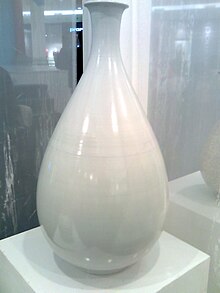Joseon white porcelain
| Joseon white porcelain | |
 |
|
| Korean name | |
|---|---|
| Hangul | 백자 |
| Hanja | |
| Revised Romanization | Joseon baekja |
| McCune–Reischauer | Chosŏn paekcha |
Joseon white porcelain or Joseon baekja refers to the white porcelains produced during the Joseon dynasty (1392-1910).
White porcelains were preferred and praised than any other porcelains during the time to represent Korean Confucian ethics such as frugality and pragmatism. In overall, Joseon ceramics undergone numerous transformations during the five hundred-year period and is generally divided into three major periods; the early, the middle, and the late period. Although the chronology of Joseon ceramics differs between scholars, three major events affected kiln production; the outcome of the Imjin wars, the establishment of Bunwon (hangul: 분원; hanja: 分院), government-subsidized kilns at Bunwon-ri, Gwangju near Seoul in 1751, and the privatization of Bunwon in 1884. Joseon white porcelains are characterized by the beauty of unpretentious forms, understated decoration, and subtle use of color, reflecting the ideals of Korean Confucian state.
White porcelain bowl, 15th century AD, Korea
White porcelain plate, 15th century AD, Korea
White porcelain jar, 18th century AD, Korea
White porcelain ewer, 18th-19th century AD, Korea
...
Wikipedia
